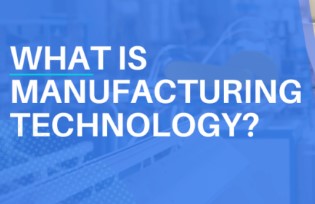Understanding Manufacturing Technology: Innovations Shaping the Future of Production
In the constantly evolving landscape of industry, manufacturing technology plays a pivotal role in how goods are produced. From small-scale operations to large industrial setups, advancements in manufacturing technology have transformed the production process, making it faster, more efficient, and sustainable. In this blog, we will explore what manufacturing technology entails, its key components, benefits, trends, and the impact it has on various sectors.
What is Manufacturing Technology?
Manufacturing technology encompasses the tools, machinery, and processes used in the manufacturing of goods. It includes a wide range of techniques that facilitate production, from traditional methods to cutting-edge innovations. The essence of manufacturing technology lies in its ability to improve production efficiency, enhance product quality, and reduce costs.
Key Components of Manufacturing Technology
- Machinery and Equipment: This includes everything from basic tools and machines to advanced robotics and automation systems. The choice of machinery directly influences production capabilities, precision, and overall effectiveness.
- Computer-Aided Design (CAD): CAD software enables designers and engineers to create detailed models and drawings of products, streamlining the design process and ensuring accuracy.
- Computer-Aided Manufacturing (CAM): CAM systems interface with machinery to automatically control production processes based on CAD designs. This integration enhances productivity and minimizes errors.
- Additive Manufacturing: Commonly known as 3D printing, additive manufacturing is a process of creating products layer by layer from digital models. It allows for complex designs and rapid prototyping.
- Internet of Things (IoT): IoT technology connects machinery and devices, enabling real-time data collection and analysis. This connectivity enhances monitoring, maintenance, and optimization of production processes.
- Artificial Intelligence (AI): AI applications in manufacturing optimize processes such as predictive maintenance, quality inspection, and supply chain management, harnessing data analysis for increased operational efficiency.
Benefits of Manufacturing Technology
- Increased Efficiency: Automation and advanced machinery streamline the production process, reducing cycle times and maximizing output.
- Enhanced Quality: Advanced manufacturing technologies, such as precision machining and quality control systems, improve the consistency and quality of products.
- Cost Reduction: By minimizing waste, optimizing resource use, and reducing labor costs through automation, manufacturing technology helps businesses lower operational costs.
- Flexibility and Customization: Advanced technologies allow for more flexible production processes, enabling manufacturers to adapt quickly to changing demands and customize products according to customer specifications.
- Sustainability: Innovations in manufacturing technology promote sustainable practices, such as energy-efficient machinery, waste reduction techniques, and the use of recyclable materials.
Current Trends in Manufacturing Technology
- Industry 4.0: The fourth industrial revolution emphasizes the integration of IoT, AI, and big data analytics in manufacturing, creating smart factories that improve efficiency and decision-making.
- Advanced Robotics: The use of collaborative robots (cobots) and autonomous mobile robots (AMRs) is on the rise, enabling safer and more efficient human-machine interactions.
- Digital Twin Technology: Digital twins are virtual replicas of physical systems used to simulate, predict, and optimize performance, enhancing the overall productivity of manufacturing processes.
- Sustainability Initiatives: Manufacturers are increasingly adopting green technologies and processes to reduce their environmental footprint while balancing economic goals.
- Remote Monitoring and Control: With improved connectivity and IoT technology, manufacturers can remotely monitor equipment performance and conduct operations from anywhere in the world.
Impact Across Industries
Manufacturing technology has far-reaching effects across various sectors:
- Automotive: Precision engineering and robotics have revolutionized vehicle assembly, enhancing safety and reducing production times.
- Electronics: Advanced manufacturing technologies enable the production of intricate electronic components with high precision and efficiency.
- Consumer Goods: Increased demand for customization has led manufacturers in this space to adopt flexible manufacturing systems to meet diverse consumer needs.
- Aerospace: Rigorous quality control processes and innovative materials are critical in aerospace manufacturing, where precision is paramount.
- Pharmaceuticals: Manufacturing technology enhances production efficiency and ensures compliance with strict regulatory standards in drug production.
Challenges in Manufacturing Technology
Despite its benefits, the adoption of manufacturing technology does present challenges:
- High Initial Costs: Implementing advanced technologies often requires significant capital investment, which may be a barrier for small and medium enterprises.
- Skill Gaps: The rapid evolution of technology necessitates a workforce skilled in new technologies, requiring continuous training and education.
- Cybersecurity Risks: As manufacturing becomes more connected, the risk of cyber threats affecting production systems grows, making cybersecurity a critical concern.
The Future of Manufacturing Technology
As we look ahead, the future of manufacturing technology is bright. Continued innovations in AI, robotics, and sustainable practices are expected to drive efficiency and productivity to unprecedented levels. The ability to adapt to market changes rapidly and incorporate customer feedback into production will become even more important.
Manufacturers must embrace ongoing change and innovation to stay competitive. Those who can effectively leverage advanced manufacturing technologies will find themselves at the forefront of their industries, equipped to meet the challenges of tomorrow’s manufacturing landscape.
Conclusion
Manufacturing technology is a cornerstone of modern industry, driving significant improvements in efficiency, quality, and sustainability. By understanding the components, benefits, and trends associated with this technology, businesses can better position themselves to leverage these advancements, ensuring their relevance and success in an ever-evolving market. As innovation continues to shape the future of production, embracing manufacturing technology will be essential for companies looking to lead the way.
